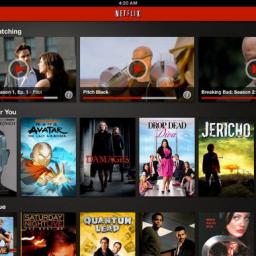Netflix claims you don’t really want offline video support
 Now that Amazon Prime is allowing offline video playback on iOS and Android devices, Netflix needs a better explanation for why it won't do the same. Previously, Netflix has argued that fast, ubiquitous Wi-Fi access would eventually make offline playback irrelevant. But in 2015, on-the-go users still struggle with getting connected, whether it's on a plane with Wi-Fi that's too slow, or in a car where a few hours of streaming on mobile broadband can burn through your data cap.
Now that Amazon Prime is allowing offline video playback on iOS and Android devices, Netflix needs a better explanation for why it won't do the same. Previously, Netflix has argued that fast, ubiquitous Wi-Fi access would eventually make offline playback irrelevant. But in 2015, on-the-go users still struggle with getting connected, whether it's on a plane with Wi-Fi that's too slow, or in a car where a few hours of streaming on mobile broadband can burn through your data cap.Unfortunately, Netflix's new excuse is even worse. Speaking to Gizmodo, Netflix Chief Product Officer Neil Hunt argued that offline playback is just too complex for people to handle. He described this as the "Paradox of Choice," explaining that when you give people too many options, they end up not choosing anything at all. Netflix apparently believes offline playback would result in this sort of paralysis. In lieu of crippling users with choice, Hunt said Netflix could install local media servers on airplanes, trains, or hotels, so users can stream without an Internet connection. Can Netflix really install its entire catalog in local servers on every means of public transport? Besides which, Netflix is still talking about things it would like to do in theory, while Amazon is providing a service that's actually useful right now.
This seems to be a result of phone manufacturers wanting to charge through the nose for anyone who wants more than 8GB of internal storage... It's actually difficult to find phones with over 32GB of storage, and a bit difficult to find phones with microsd slots... All too often low-end phones have them (eg. Moto-E), while the more expensive high-end phones do NOT (Moto X), and have less storage space as a result. Meanwhile, a 32GB microsd card costs just $10, far less than the cost of buying a different model of phone with more internal storage space.